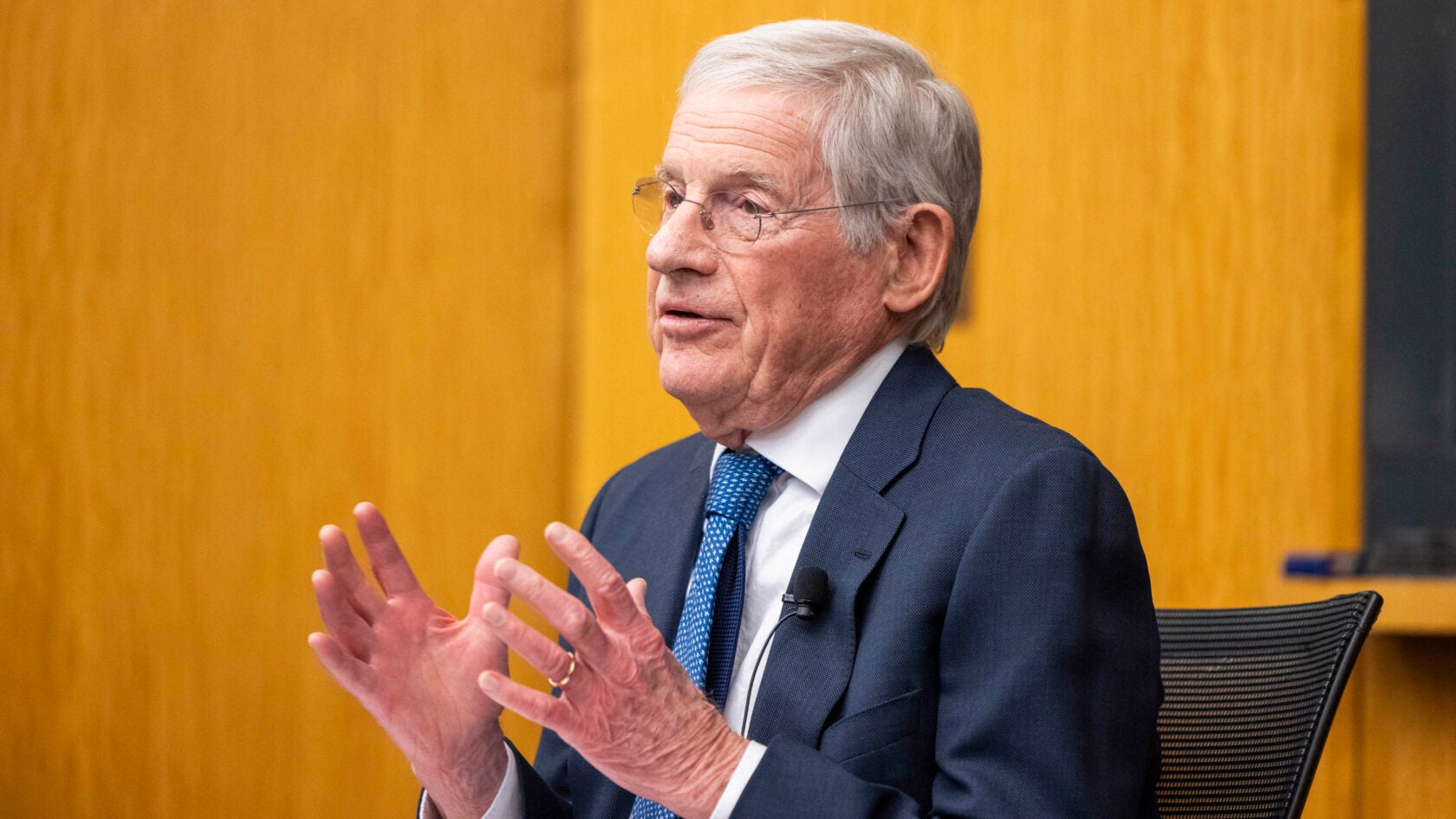Why Democrats, Republicans, who appear at war these days, really need each other
Political philosopher Harvey C. Mansfield says it all goes back to Aristotle, balance of competing ideas about common good

Harvey C. Mansfield delivers a lecture as part of the Vik-Bailey Lecture Series.
Photo by Scott Eisen
Harvey C. Mansfield doesn’t want to see the end of the Democratic Party. In fact, at times he wants them to win, which may come as a bit of a surprise to some.
Mansfield ’53, Ph.D. ’61, has been an influential voice on campus for conservative political views for more than six decades. He counts among his former students Bill Kristol ’73, Ph.D. ’79, founder of The Weekly Standard and The Bulwark; Francis Fukuyama, Ph.D. ’81, Olivier Nomellini Senior Fellow at Stanford University; and Tom Cotton ’99, J.D. ’02, Republican senator from Arkansas.
Mansfield, the William R. Kenan Jr. Professor of Government, retired from teaching last year but continues as a researcher. He returned to the podium March 21 as part of the Department of Government’s Vik-Bailey Lecture Series to explain why American Democracy functions only when the two parties co-exist.
To understand our political system today, Mansfield explained, we must return to the Greek philosopher Aristotle and his ideas of what good governance looks like. It begins with understanding the distinction between “rule” and “representation.”
“Both are for the common good, but differently,” he said. “Rule is when a government imposes the notion of the common good. Representation is the common good elicited from the people by consent.”
Aristotle, he continued, believed in two definitions of common good — common benefit (what we have in common as humans and innate equality) vs. benefit in common (a shared positive outcome obtained by favoring the few).
“Aristotle’s interpretation of the common good is that it arises not from the many but from and to the advantage of the few who are better in some way, and who contribute more than the many.”
Mansfield, who began teaching at Harvard in the 1960s, has written on Edmund Burke and the nature of political parties, Machiavelli and the invention of indirect government, and in favor of a constitutional American political science. In 2007 he published a book on manliness. His most recent book is last year’s “Machiavelli’s Effectual Truth: Creating the Modern World.”
He went on during his talk to explain that 17th-century liberalism like that devised by philosopher John Locke — a system opposed to church rule and in favor of equal representation — is the basis of America’s liberal democracy. It is not, however, free from the rule demonstrated by governments that have come before.
“Liberalism offers an escape from the oppression of having a way of life imposed by rule and replaces it with a government that allows and protects societies’ choices of how to live — a government that represents rather than rules.”
Classical liberalism’s biggest fault? According to Mansfield, representative government has an “empty center,” and its unlimited possibilities lead to a vacuum filled by human nature’s inclination for power.
“Once liberalism has been established, the empty center disappears as it is filled with a free exercise of choices made and paths taken,” he said.
Parties — Democratic and Republican — are the result of classical liberalism’s power vacuum. Both aim to rule, with dueling definitions of the common good. This tug of war, Mansfield said, is what keeps democracy going.
“Neither party wins permanently, and neither deserves to,” Mansfield said. “To see why we can return to the two common goods Aristotle sets down for us. In the United States for this two-party system, each party stands for one of Aristotle’s definitions.”
In today’s world, Democrats take the side of the common benefit, while Republicans favor benefit in common.
“Democrats stand for inclusiveness. They want to include everybody in a whole of equal individuals that resembles Aristotle’s first definition of the common benefit,” Mansfield said. “Their focus on inclusiveness turns their attention mainly to those who are excluded from the whole either by design or by neglect … Democrats care for them with the appropriate virtue of compassion, sometimes called empathy, which they praise and claim for themselves.”
He went on to say, “Republicans for their part, want a whole of variegated individuals, in which some are held more valuable because they contribute more than others — Aristotle’s second definition of the benefit in common. They prefer looking up in admiration to looking down in compassion … They themselves feel vulnerable not because they are excluded, but because they are open to attack as rich and privileged. They think of themselves as givers rather than takers.”
Both understandings, Mansfield said, thrive off having the other as a challenger.
“Harvard never wants Yale to win,” he said. “Yet the rivalry would be lost if Yale never won.”
Mansfield critiqued modern liberalism as overly politicized, and conservatism as overly pessimistic.
“Liberalism thrives when it respects and nourishes the distinctions and formal differences of community life, as opposed to attempting to flatten and overcome them by politicizing every separate activity. Politicizing is hyper-partisan. Partisanship needs to be kept within bounds,” he said.
“Conservatives forget where they are winning and think mainly of where they are losing. Conservatives care more for culture where they think they are losing, and liberals care more for the economic issues, where they think they are losing. Conservatives tend to be pessimistic. They lose because they’re always playing defense. Liberals are optimistic — they think they can do away with opposition from conservatives and transform controversies into entitlements.”
He concluded by saying that both parties lose sight of tried-and-true liberalism, which gives them “partial victories, dimmed by partial defeats.”




